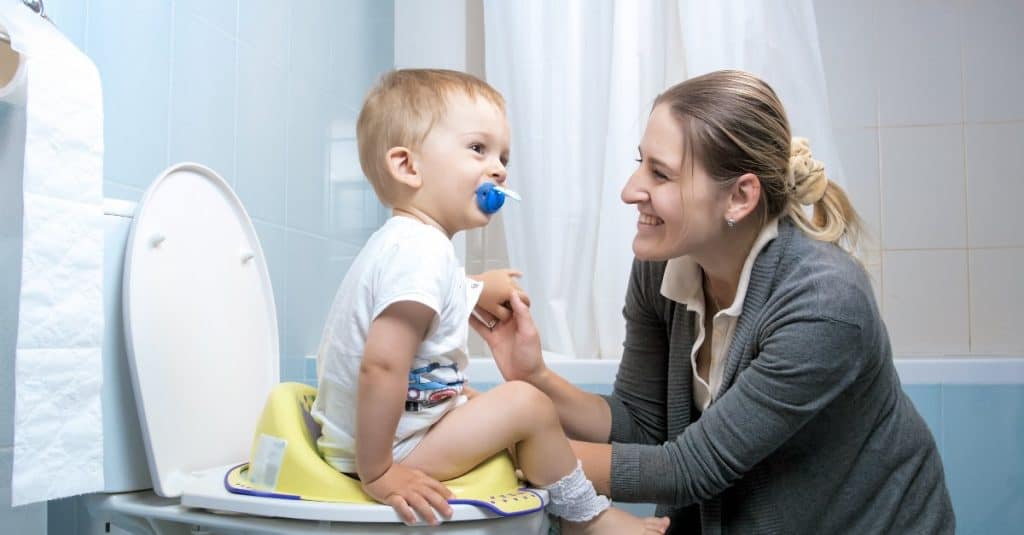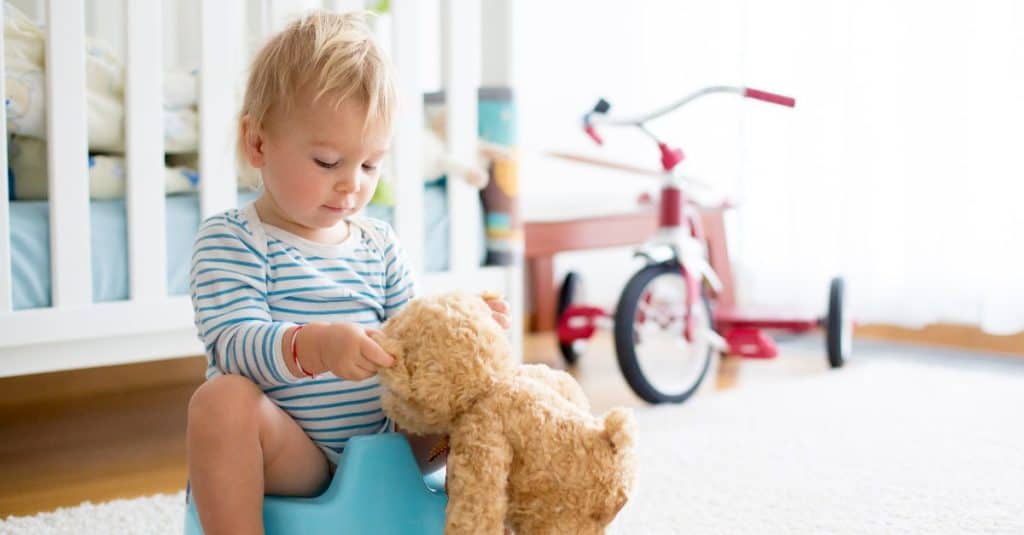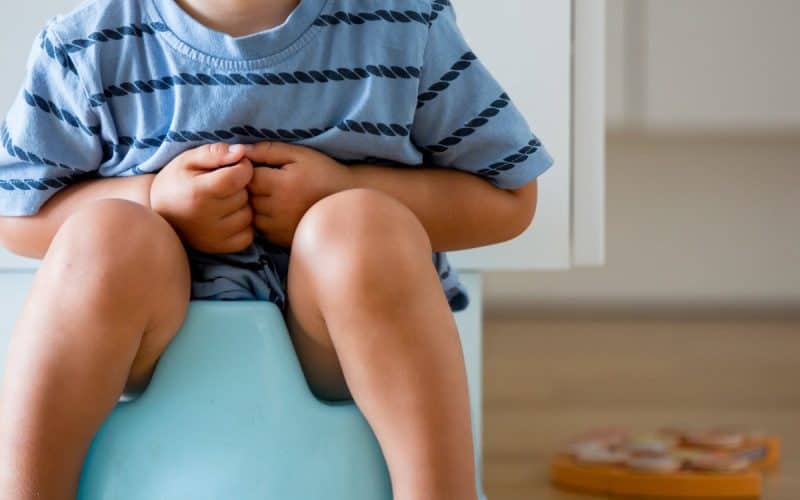Once your child has mastered daytime potty training, nighttime potty training becomes the next hurdle before both of you gain complete freedom from pull-ups and diapers. Oftentimes, heavy sleepers will sleep through the urge to pee, and won’t be able to wake themselves up to use the bathroom.
Nighttime potty training is also dependent on the developmental maturity of a child’s urinary system, and whether their brain can wake their body up in time to use the bathroom at night. This can make potty training at night doubly hard and frustrating for all parties involved – especially for heavy sleepers!
Nighttime potty training is not impossible, even if it may seem that way with a heavy sleeper. It can take up to a year for a child to perfect nighttime potty training, so arm yourself with patience, waterproof mattress protectors and extra sheets for at least a year after nighttime potty training begins.
Nighttime Potty Training for Heavy Sleepers
1. Do Daytime Potty Training First

Generally speaking, establishing daytime dryness is easier than it is at night. Your child is awake and alert and will be able to identify when they need to use the bathroom and get there in time. They also gain better control and use of their bladder and sphincter muscles that will help them hold it at night.
2. Decide When to Begin
Nighttime potty training for heavy sleepers needs to be done as soon as possible, so keep an eye out for signs that indicate that your child is ready to begin.
- Waking up dry at least once a week after naps and nighttime sleep.
- Waking themselves to use the bathroom at night.
- Not wanting to wear pull-ups or diapers at night.
- Waking you to take them potty or to ask diaper change in the middle of the night.
Chose a non-stressful time when no other major life events or transitions are happening. They will be better able to focus on their potty training without becoming overwhelmed or distracted. Making potty training a positive experience for your child is important.
While there is no set age at which children will be ready for nighttime potty training, there are a few ways you can encourage the process. This is needed for heavy sleepers since these initial rest cycle disruptions will definitely sour their moods!
Children often have a desire to copy their parents’ actions, and you might demonstrate to them how easy it is for you to walk to the bathroom and use the toilet at night. Reading a bedtime story about going to the potty also works for many.
3. Have a Solid Bedtime Routine

The circadian rhythm is more than just an internal clock that tells you when to go to sleep and when to wake up. It is one of your body’s most powerful mechanisms that helps regulates homeostasis.
It is also instrumental in controlling physiological processes such as the production of excretory products. An increase in the production of the vasopressin hormone is responsible for water reabsorption in the kidneys and decreased urine output at night.
An erratic bedtime routine will make it more difficult for your child’s body to develop a regular circadian rhythm. Set your child’s bedtime routine to have set times and activities done in a set order to help their body develop a good circadian rhythm.
4. Limit Liquids Before Bed
Your child is less likely to become thirsty at night if they are adequately hydrating throughout the day. Keep their water bottle somewhere they can easily reach and encourage them to drink as much as they want. You can even devise a reward system to further incentivize hydrating.
Try limiting their fluid intake for about an hour or two before bedtime – and that goes double for heavy sleepers!
Having to pee at night will especially interrupt the rest cycle of heavy sleepers, making it difficult for them to get back to bed. Sometimes, they might not even wake up but still void their bladders, leading to awkward bedwetting situations! It is up to you whether to cut liquids entirely for the night or limit them to a few sips before bed.
If you do decide to allow drinks in the hour before bed, have them go to the potty right before getting into bed as an extra precaution against accidents.
5. Keep the Potty Close By

Keep the potty chair in their room and close by at night, especially if the bathroom is a distance away from your child’s bedroom. Use nightlights in their bedroom and in the hallway to help them find their way in the dark and clear the floor of toys and furniture so there isn’t anything to trip over.
6. Wake Them Up to Use the Bathroom
Some parents may choose to wake their children to use the bathroom before going to bed themselves. Others dislike the method, as it disrupts the child’s sleep.
If you do decide to wake your child to use the bathroom at night, they need to be awake and alert enough to understand what’s going on – to walk to the bathroom or potty, pee, clean up, and then go back to bed.
Simply carrying a sleeping child to the potty or bathroom isn’t going to be effective, as a half-asleep child won’t have enough awareness to sense what is going on in their body and their surroundings.
While some children may be fine with being roused from sleep to go to the bathroom, others will understandably not be very pleased. Don’t push this method too hard if your child isn’t a fan of it or is upset and irritated at being woken up in the middle of the night.
7. Rule Out Other Issues Affecting Potty Training

A doctor may be able to rule out any physiological and medical concerns that may hinder nighttime potty training. Medical conditions such as urinary tract infections can make urinating painful, and a child may choose to hold their pee to the point of having an accident.
Physical issues such as a small bladder or poor bladder control can lead to leaking and frequent accidents. Constipation can cause stool to accumulate in the colon and put pressure on the bladder, which can lead to leaking and accidents.
Using the potty is a “big kid” step, and big stresses that come with transitional milestones such as starting pre-school or welcoming a new sibling can affect their potty training progress. Some children experience stress-related regression that can for a week or two, coinciding with a major life event or transition.
8. Be Patient
Understandably, a prolonged potty training process is frustrating and maddening. But try to see the situation from your child’s point of view. They don’t enjoy wetting the bed either, and likely feel just as frustrated and helpless as you do.
Continue to use positive reinforcement and reward them each time they wake up dry. This could be a promise to make their favorite breakfast or a trip to the ice cream shop in the afternoon. A new bedding set or a special pair of pajamas may also help motivate them to stay dry throughout the night.
If your child does have an accident, don’t make too big a deal out of it, and try not to act upset or irritated when you have to change their sheets in the middle of the night. Making them feel bad about something they can’t change won’t help the nighttime potty training process.
